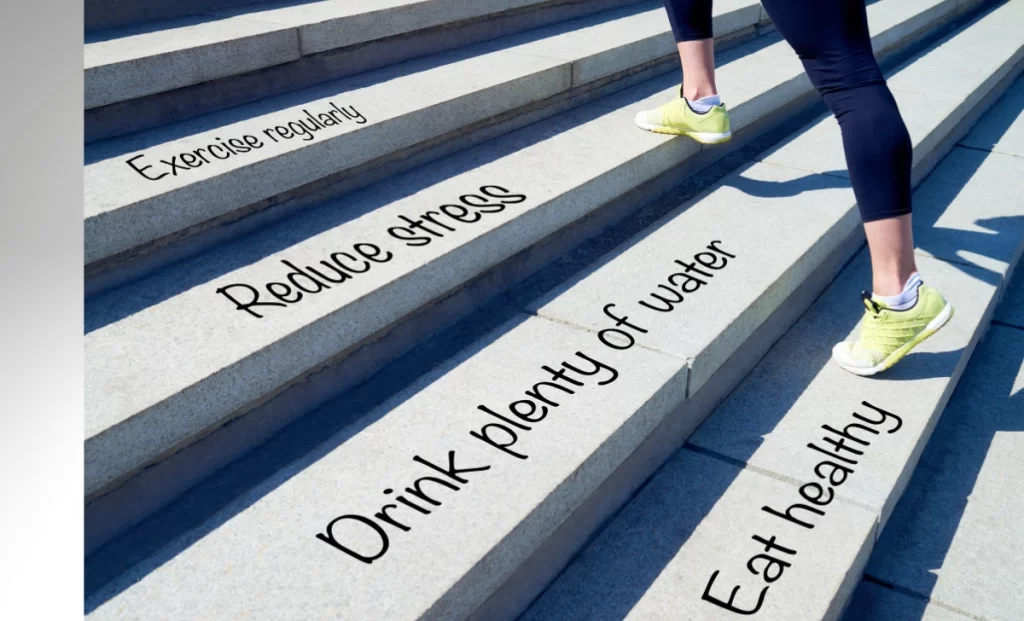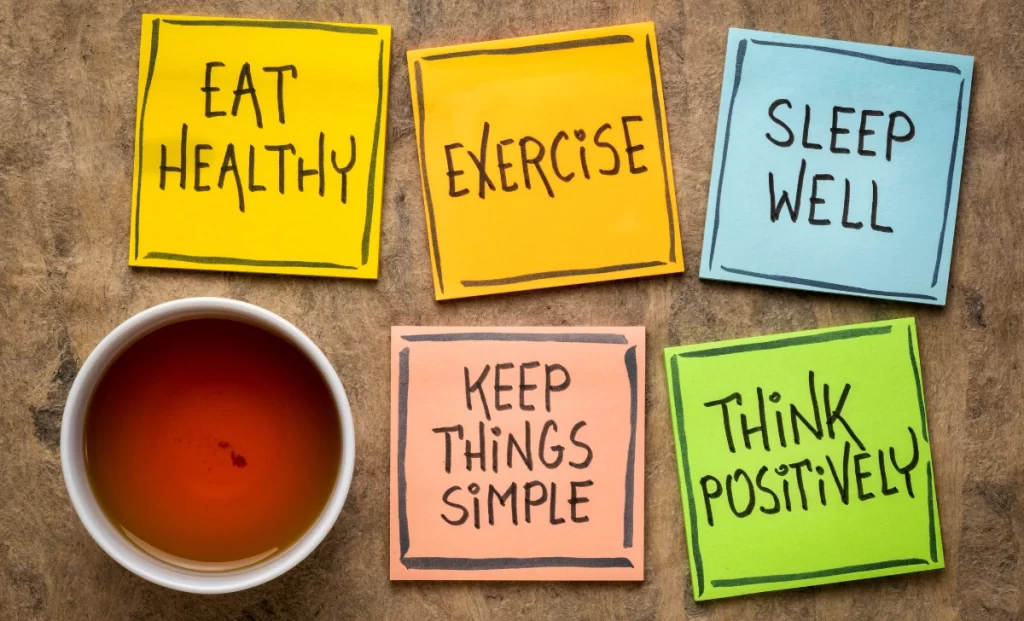Staying healthy and living life to the fullest doesn’t have to be complicated with our healthy lifestyle tips. We’ve got you covered with topics that will help you take control of your health, reach your goals, and turn your resolutions into positive habits. From nutrition to stress relief, learn how each topic can help you lead a healthier and happier life. It all starts with healthy lifestyle habits.
Get Moving – Exercise Regularly
Number one in our healthy lifestyle tips is regular exercise. Regular exercise is one of the most important aspects of healthy living. It can reduce your risk for chronic diseases like heart disease and diabetes, help you manage stress, improve your balance and coordination, and boost your mood. Aim for at least 30 minutes of moderate physical activity a day and a variety of activities to stay healthy and energized.

Top Tips to Keep You on Track:
- Commit to having your workout just the same as any other important appointment in your day. Schedule it, take it seriously, and treat it that way.
- Set Goals, when setting your fitness goals, set realistic objectives based on what type of exercise you’re going to do and how much time you’re willing to commit each week.
- Choose an Exercise You Can Do Regularly. Pick an exercise or physical activity that you genuinely love doing, enjoy, and can make time for doing every day or at least four days a week.
- Find A Workout Partner. Having a friend or trainer who’s by your side during the workout will help you stay motivated and consistent with your routine.
- Try Something New. Switch up your routine every couple of weeks to add diversity to your workout program and keep it from getting dull and boring! Try something that’s outside of your comfort zone like yoga, Pilates, kickboxing, or dance classes.
- Warm Up Before Your Workout. Ever heard of dynamic stretches? They involve subtle movement back and forth around a particular joint angle which increases core body temperature and further increases blood flow throughout the body leading to more energy for an effective as well as, safe workout session!
- Monitor Your Progress. Keep track of how much weight and reps you’ve done this week compared with last week’s total number that way you can adjust accordingly as needed depending on whether or not you are meeting goals on schedule or need more exercises added or taken away from sessions altogether!
Mindful Eating Habits, Healthy Lifestyle Tips
Why healthy eating is important; eating healthy on a regular basis is essential for proper body functioning and a longer, healthier life. Try to include a variety of foods from each of the food groups in your daily meals. Regularly minding what you eat is also important to make sure you don’t over-indulge or make unhealthy eating habits. While it’s tempting to reach for fast food in times of stress, try to make conscious decisions when it comes to your meals and snacks.

Healthy Lifestyle Tips, Steps to Healthy Eating:
- Eat a Variety of Foods. Eating a variety of foods is essential to ensure that you get all the necessary vitamins, minerals, and other nutrients your body needs to stay healthy. Make sure to include fruits and vegetables, whole grains, lean proteins, low-fat dairy, and healthy fats in your daily diet.
- Stay Hydrated. Staying hydrated is important for overall health as it helps to flush out toxins and maintain energy throughout the day. Aim to drink 8 glasses of water daily and avoid sugary drinks like soda and juices. Herbal teas are also a great way to rehydrate after exercise or a hot day outside.
- Eat Regularly. Eat meals on a regular schedule; this will help regulate your metabolism and keep your energy levels consistent throughout the day. Keeping snacks nearby can help prevent overeating during mealtimes by helping curb hunger between meals.
- Limit Processed Foods. Processed foods can contain high amounts of added sugars and unhealthy fats that lead to weight gain and poor nutrition overall. Be sure to check ingredients lists for added sugars when shopping for processed foods – if sugar appears high up on the list then it’s best avoided!
- Avoid Overeating. Overeating can lead to rapid weight gain due to excess calories consumed which can have long-term negative health effects like hypertension, heart disease, and diabetes. Eating only until you are satiated with every meal can help maintain a healthier weight range as well as reduce stress on your digestive system from excess consuming large amounts of food at once.
- Get Active Regularly. Regular physical activity plays an important role in maintaining good health, even just 10 minutes per day has been shown to have benefits. It can also aid in digestion which will enable better nutrient absorption from food so make sure you squeeze some movement into each day.
- Monitor Your Portions. Portion control plays an important role in healthy eating habits; be mindful about how much food you put onto your plate during mealtimes as this will determine how many calories you’re consuming at each mealtime so take care not to overdo it!
Practice Stress Release Techniques
Stress is at the core of many issues – physical, mental, and emotional. Taking action to address unhealthy levels of stress can have a huge impact on your overall health. Begin by identifying potential stressors in your daily life, then look for healthy ways to manage that stress. There are a variety of techniques to reduce levels of stress including yoga, deep breathing exercises, and mindfulness meditation. Practicing these techniques can significantly improve your mood, boost happiness, and help you handle stressful situations more effectively. Healthy lifestyle tips you can easily add to your daily routine are easy and reduce stress.

Steps to Reduce Stress:
- Practice mindful breathing. Mindful breathing can help reduce stress and increase relaxation. Focus on your breath and pay attention to the sensations of each inhale and exhale. This helps to clear your mind and shift focus from stressful thoughts.
- Try yoga or stretching. Regular physical activity is important for stress relief, even if it’s something as simple as taking a walk or doing some light stretches in the morning or before bedtime. Yoga combines both physical movements with recommended mindful breathing exercises so you can ease stress as well as stimulate the body physically.
- Get enough sleep. Many people struggle to get enough sleep at night, but getting 7-9 hours per night is essential for reducing stress levels. When we are tired, our bodies are more prone to trying to cope with everyday situations which can be harder when we don’t have enough energy going into it, which also increases our anxiety levels.
- Practice progressive muscle relaxation. Progressive muscle relaxation involves slowly tensing and then relaxing each muscle group in your body one by one from head to toe over a period of several minutes. It helps to create a sense of relaxed awareness throughout the body and has been shown to reduce the intensity of mental health symptoms such as depression and anxiety associated with long-term chronic stress.
- Listen to music you enjoy. Music is known to have calming effects on some people, especially those who experience anxiety or depression in certain situations such as during interpersonal interactions or when feeling overwhelmed by their environment or situation.
- Take time out for yourself. Taking time out for yourself away from the pressures of everyday life can help relieve built-up stress levels significantly. Whether it’s spending some time alone reading an interesting book or going out somewhere different (park, beach, etc) just remember that it’s essential making sure you keep regular breaks.
- Reach out to others. If nothing else seems to work reach out and talk with somebody close who understands you. Talking through problems often makes you feel less overwhelmed, and bottled up inside. Your stress may only grow bigger over time if left unaddressed. You may also consider talking about things with a professional if this makes more sense to you.
Get Enough Sleep, Healthy Lifestyle Tips
Did you know that getting enough sleep plays a huge role in your overall well-being? The recommended amount of sleep for adults is between 7 to 9 hours a night. Getting sufficient restful sleep is important for maintaining mental and physical health. Investing in quality bed linens, limiting caffeine and alcohol intake before bedtime, and making sure the environment is dark, quiet, cool, and comfortable can increase the quality of sleep. Additionally, creating an evening routine to relax your mind can help ensure a good night’s sleep.

Tips to Get Restful Sleep:
- Exercise during the day. Regular exercise during the day will help your body prepare itself for sleep by releasing hormones (endorphins) that make you feel calm and relaxed to counteract stress throughout the day. It’s also important to end your exercise routine at least two hours before bedtime, so your body has time to cool down and relax following a workout.
- Reduce caffeine intake. Caffeine is a stimulant, which can interfere with your sleep patterns if you drink it too close to bedtime. It’s best to limit your intake of coffee, energy drinks, and other caffeinated beverages – especially in the late afternoon or evening.
- Stick to a regular sleep schedule. Setting a consistent bedtime and wake-up time is an essential part of creating quality sleep habits. Having a routine helps regulate your internal clock by setting expectations for when you should be sleeping or awake each day and night.
- Create an ideal sleeping environment. Creating an environment conducive to sleeping is key for making sure you get enough restful sleep throughout the night. Invest in blackout curtains or eye shades if need be, and keep the temperature comfortable – not too hot or cold – as well as peaceful and dark to maximize quality levels of sleep.
- Wind down before bed. Take some time before getting into bed each night for activities that foster relaxation, like reading a book or taking a warm bath – both provide good opportunities for winding down from the day’s stressors and relaxing both mentally and physically otherwise known as “sleep hygiene”.
- Avoid screens before bedtime. The blue light coming from phone screens activates certain areas inside our brains associated with being alert; limiting screen use at least 30 minutes prior to hitting the hay can help avoid over-stimulation so we can drift off easily once we’re tucked in.
- Practice calming techniques. Taking the time each night on calming techniques such as progressive muscle relaxation or breathing exercises can help reduce stress levels leading up to falling asleep easier than if you didn’t practice them at all.

Connect With Nature & Spend Time Outdoors
Spending time outdoors and connecting with nature helps us feel grounded, rested and relaxed. Whether it’s a park, beach, forest or mountain top, getting some fresh air can help clear the mind. Studies have also found that spending time in nature has a number of mental health benefits including reducing stress, improving mood and increasing self-esteem. So don’t forget to schedule time for outdoor activities such as walks in the park, bike rides or camping trips to reduce stress levels and improve overall health.
- Put down your phone. Spend at least 10 minutes per day unplugging your technology devices and the internet. Reconnect with nature and try to take in all of its beauty. Listen to the birds singing and take notice of the plants around you. Take this time to center yourself in the present moment and clear your mind.
- Go for a nature walk. Going for a short daily nature walk will help you slow down and appreciate all that Mother Nature has to offer. A simple 20-minute stroll each day can provide an inviting escape from reality while allowing you to explore changes in the natural environment around you on a deeper level.
- Take care of planet Earth. Doing small things like not littering and picking up discarded garbage can make a big difference when it comes to connecting with Earth and taking care of it wisely. Make it a habit to do simple tasks like these to start making positive impacts on our planet, no matter how small they may seem! This is an excellent way to show respect for Mother Nature while also teaching this valuable lesson to children who are observing our actions as well.
- Plant something. Whether it be a flower, fruit, vegetable, or tree, planting something helps build that connection with nature even more. Not only does this activity allow us to become more connected with our world, but it can also help create habitats for other creatures in need as well, birds building nests, snakes resting in shade, or insects finding food can be accomplished by planting one simple seed.
- Take mental photos and make art. Instead of always trying to capture moments on your phone or camera, take the time during each adventure outdoors to capture those special moments through art instead. Use paints, pencils, or any other kind of art supplies available and think up new ways to depict what’s around you through picture drawings. Art is often one of the best ways we can connect with something outside ourselves and gain an understanding of the perfect balance within nature that exists between wildlife and humans alike.
- Cook with foods and plants local to you . Buying food locally using seasonal fruits & veggies is economical and efficient, as well as being healthy and environmentally friendly. It also teaches us about the seasons and which crops grow when. In addition, this assists us in connecting with what’s near us like trees and wildflowers, giving off those wonderful aromas, that fill us with joy. You’ll get both fresh air and learn about native vegetation nearby.
- Spend time together outdoors. What better way than spending quality family time outside surrounded by nature? Taking hikes together as a family or group enables the very young to the very old to learn and continue learning about plants as well as animals. This promotes education growth at home which might even spark new ideas for sports one could enjoy. Include fun such as outdoor activities like drumming circles for a deeper spiritual connection with whatever mother nature has waiting.

In Conclusion, Healthy Lifestyle Tips
In conclusion, healthy lifestyle tips help you to incorporate a wellness plan and healthy living into your lifestyle for a longer healthier life. Healthy living is about more than just eating the right foods and exercising regularly. It is about maintaining balance in all aspects of your life. This means taking the time to nourish your mental, physical, and emotional health, as well as forming meaningful relationships with the people around you. With dedication and commitment, you can develop healthy habits that will support your long-term well-being and wellness plan.
Read about the Miracle of Omega-3s here.
Read more about preventing diseases through Healthy Lifestyle Habits here.
ADD ADHD Alzheimers antioxidants arthritis Best Sources of Omega 3 6 9 Fatty Acids cancer exercise fatty acids fatty fish fermented foods fish oil flax seed oil health benefits healthy diet Healthy Lifestyle healthy lifestyle benefits healthy lifestyle food Healthy Weight loss heart disease herring hummus indoor herb garden grow light indoor herb garden kits indoor herb garden on wall indoor herb garden planters jackfruit joint stiffness mackerel meditation mental health mushrooms oily fish omega-3 omega-3 fatty acids omega 3 6 9 risks and side effects Omega3tips.com salmon sardines super foods tuna unplug vitamins Weight loss wellness
A healthy lifestyle, including maintaining a healthy weight, regular physical activity, eating nutritious food, and avoiding smoking, can help you live longer and reduce your risk of developing serious health conditions. Studies have shown that individuals who follow a healthy lifestyle live an average of seven to 10 years longer than others, with a lower risk of chronic illness and better physical vigor.
[SOURCES]
Read more about Preventing diseases such as Alzheimer’s Disease through Healthy Lifestyle Habits.


